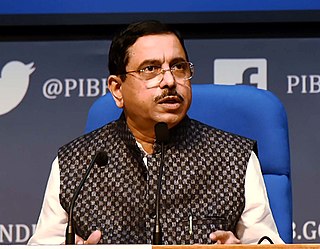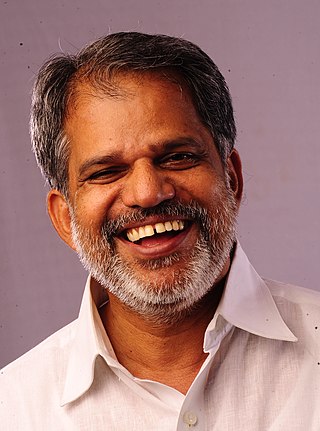Related Research Articles

The Rajya Sabha,constitutionally the Council of States,is the upper house of the bicameral Parliament of India. As of 2022,it has a maximum membership of 245,of which 233 are elected by the legislatures of the states and union territories using single transferable votes through open ballots,while the president can appoint 12 members for their contributions to art,literature,science,and social services. The potential seating capacity of the Rajya Sabha is 245,according to article 80 of the Indian Constitution. Members sit for staggered terms lasting six years,with about a third of the 238 designates up for election every two years,in even-numbered years. Unlike the Lok Sabha,the Rajya Sabha is a continuing chamber and hence not subject to dissolution. However,the Rajya Sabha,like the Lok Sabha,can be prorogued by the president.

The Lok Sabha,constitutionally the House of the People,is the lower house of India's bicameral Parliament,with the upper house being the Rajya Sabha. Members of the Lok Sabha are elected by an adult universal suffrage and a first-past-the-post system to represent their respective constituencies,and they hold their seats for five years or until the body is dissolved by the President on the advice of the council of ministers. The house meets in the Lok Sabha Chambers of the Sansad Bhavan,New Delhi.

The Parliament of India is the supreme legislative body of the Republic of India. It is a bicameral legislature composed of the president of India and two houses:the Rajya Sabha and the Lok Sabha. The president in his role as head of the legislature has full powers to summon and prorogue either house of Parliament or to dissolve the Lok Sabha. The president can exercise these powers only upon the advice of the prime minister and his Union Council of Ministers.

The Government of India,known as the Union Government or Central Government but often simply as the Centre,is the national government of the Republic of India,a federal democracy located in South Asia,consisting of 28 union states and eight union territories. Under the Constitution,there are three primary branches of government:the legislative,the executive and the judiciary,whose powers are vested in a bicameral Parliament,President,aided by the Council of Ministers,and the Supreme Court respectively. Through judicial evolution,the Parliament has lost its sovereignty as its amendments to the Constitution are subject to judicial intervention. Judicial appointments in India are unique in that the executive or legislature have negligible say.

The 14th Lok Sabha was convened after the 2004 Indian general election held in four phases during 20 April –10 May 2004,which led to the formation of first Manmohan Singh ministry (2004–2009). Indian National Congress-led United Progressive Alliance won 62 more seats than previous 13th Lok Sabha. The Lok Sabha is the lower house in the Parliament of India. 8 sitting members from Rajya Sabha,the Upper House of Indian Parliament,were elected to 14th Lok Sabha after the 2004 Indian general election.
Basudeb Acharia is an Indian politician and a leader of the Communist Party of India (Marxist) political party. His ancestors were originally from Present-day Tamil Nadu,who settled in Bengal in 16th Century. He considers himself to be a Bengali.
Kotla Jayasurya Prakasha Reddy was a member of the 15th Lok Sabha of India. He represented the Kurnool constituency of Andhra Pradesh and is a member of Indian National Congress.

Indrajit Gupta was an Indian politician who belonged to the Communist Party of India (CPI). From 1996 to 1998,he served as Union Home Minister in the United Front governments of prime ministers H. D. Deve Gowda and I. K. Gujral. That was a dramatic reversal of roles,as the home ministry had,since independence in 1947,banned the CPI thrice,with many of its members,including Gupta,being sent to prison or pushed underground for long stretches. He was the longest-serving member having been elected eleven times to the Lok Sabha the lower house of Indian Parliament.He suffered his only electoral reverse when he lost to Ashok Krishna Dutt in 1977 after the CPI supported Emergency.

The Ministry of Parliamentary Affairs is an Indian government ministry. It is headed by the Union Cabinet Minister of Parliamentary Affairs.

A. Vijayaraghavan is an Indian politician belonging to the Communist Party of India (Marxist),and is the current Convener of Left Democratic Front in Kerala and former Acting Secretary of CPI(M) Kerala State Committee. He was born at Malappuram. He was a Member of the Parliament of India representing Kerala in the Rajya Sabha,the upper house of the Parliament. He was the chairman of parliamentary committees on Subordinate Legislation and General Assurances,He was also the Chief Whip of CPI(M) in Rajya Sabha. He was elected to Lok Sabha from Palakkad in 1989. He is the Central Secretariat member of CPI(M) and General Secretary of All India Agricultural Workers Union.

A Member of Parliament in the Lok Sabha is the representative of a legislative constituency in the Lok Sabha;the lower house of the Parliament of India. Members of parliament of Lok Sabha are chosen by direct elections on the basis of the adult suffrage. The maximum permitted strength of members of parliament in the Lok Sabha is 550. This includes the maximum 530 members to represent the constituencies and states and up to 20 members to represent the union territories. Between 1952 and 2020,two seats were reserved for members of the Anglo-Indian community. The current elected strength of the Lok Sabha is 543. The party—or coalition of parties—having a majority in the Lok Sabha chooses the Prime Minister of India.
Rameshwar Sahu was an Indian politician. He was elected to the Lok Sabha,the lower house of the Parliament of India from the Rosera in Bihar as a member of the Indian National Congress. He was Deputy Finance Minister of India from 1964 - 1965. He was Chairman of all India Railway in 1971-1972. He left his politics carrier in 1972.
The Ajmer Legislative Assembly was the Vidhan Sabha of Ajmer State,India.
Ramendra Kumar Yadav also called Ravi was an Indian politician. He was a Member of Parliament,representing Bihar in the Rajya Sabha the upper house of India's Parliament.
Sagar Rayka is an Indian politician. He was a Member of Parliament,representing Gujarat in the Rajya Sabha the upper house of India's Parliament as a member of the Indian National Congress.
Natvarlal Bhagwandas Parmar was an Indian politician. He was elected to the Lok Sabha lower house of the Parliament of India from Dhandhuka,Gujarat as a member of the Janata Party.

Shashibhai Mavajibhai Jamod was an Indian politician,social worker,lawyer,engineer and businessmen. He was elected to the Lok Sabha,the lower house of the Parliament of India from Bhavnagar in Gujarat as a member of the Indian National Congress.
Mali Mariyappa was an Indian politician,elected to the Lok Sabha,the lower house of the Parliament of India as a member of the Indian National Congress.
M. Basavaraju was an Indian politician of the Indian National Congress. He was also member of Karnataka Legislative Assembly and member of Rajya Sabha.
References
- ↑ India. Parliament. Lok Sabha (1985). Lok Sabha Debates. Lok Sabha Secretariat. p. 145. Retrieved 20 September 2020.
- ↑ India. Parliament. Lok Sabha. Committee on Government Assurances (1983). Report - Committee on Government Assurances. Lok Sabha Secretariat. p. 24. Retrieved 20 September 2020.
- ↑ "Members Bioprofile". Lok Sabha . Retrieved 20 September 2020.